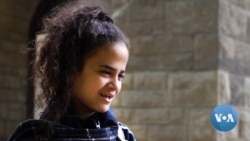Deaf children in Egypt face serious obstacles when seeking an education because many come from poor families and rural areas far from the capital, Cairo. Experts say nearly 5 million of Egypt’s 100 million residents are deaf, due in part to frequent intermarriage of close relatives.
Notwithstanding their broad smiles and bubbling enthusiasm, deaf children in Egypt must cope with serious challenges at the same time the organizations that work to educate them struggle to run quality programs.
Clair Malik, an educator who founded and built the Egyptian diocese of the Episcopal Church’s Deaf Unit from scratch in 1982, said the school must work not only with deaf children, but also with their parents, many of whom come from poor and rural areas and are often uneducated.
She said the school tries to teach the parents sign language to help them communicate with the children.
Malik, who studied at Gallaudet University for the deaf in Washington, D.C., even though she is not deaf, said there has been major progress in educating deaf people in recent years. Graduates of the Deaf Unit have gone on to attend university, she said, and Egypt now boasts sign-language interpreters on government TV and in at least one university.
Mary Ishaq, who runs the school, watches over the many details of how her staff interacts with the students. She told VOA there are both theoretical and practical aspects to educating deaf people:
“The children,” she said, “learn reading and writing from an academic perspective and then they learn a skill, so that they can earn a living and not depend on society to support them.”
The Rev. Clement Alfons, a deaf social worker, has worked to become a bridge between the deaf and those who can hear. He said he became involved with the deaf while growing up in Sudan and observing their hardships.
Father Alfons told VOA that deaf children like himself “were shoved aside by society and marginalized” when he was growing up.
“Deaf children,” he said, “often have bad habits and values because they frequently have bad role models.”
Anglican Bishop Dr. Mouneer Anis said that despite the constant challenge of raising funds to run the school and keep it staffed, he is proud of what it has accomplished.
He said that “rather than being just neglected children,” students of the Deaf Unit “are now cared for” and “given the chance to play sports, learn handcrafts and socialize with their peers.”
“They also get educated,” he said, “and some of them reach university .... becoming productive and respected members of society.”
One of the most serious problems facing the Deaf Unit this year is the COVID-19 pandemic, which has forced the closure of the residential side of the program. Mouneer said that was a difficult decision to make.
He said the Deaf Unit used to provide accommodation for the many children who come from far away and who cannot afford transportation every day.
Because of the pandemic, he said, “we are not able to bring them close together, because this increases the risk of being infected with the virus.”
A graduate of the school, 16-year-old Esther is one of the lucky few among deaf children in Egypt, completing six years at the Episcopal Church’s Deaf Unit in Cairo, before going on to a government high school. She says she is proud of her accomplishment and comes back regularly to see former teachers and classmates.
Esther told VOA in sign language that “government schools are not as good as the Deaf Unit,” but that she “hopes to go on to college and study homemaking.” She adds jokingly that she’s “not sure if she wants to get married and have children.”
Ten-year-old Julia, who has learned to speak several short phrases, despite being deaf, enthusiastically shows off her new skills and language abilities. Malik said “it is now possible to help many deaf children to partly overcome their hearing impairments if they are given medical treatment early in life.”





